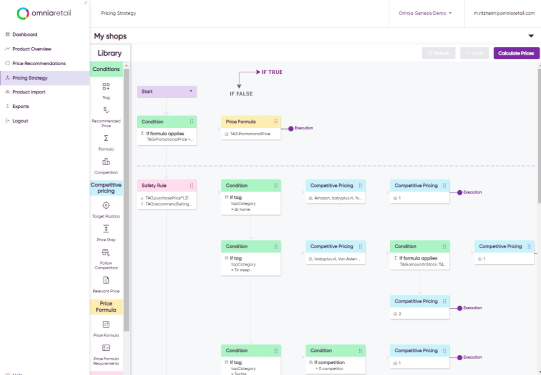Dear customers and partners,
You have millions of things to worry about right now. I am here to assure you that the Omnia pricing software is not one of them.
Before I launch into business, I want to take a moment to recognize the gravity of this current pandemic. I know this touches everyone in a deeply personal way. As a father of two very young children, I understand and share your concerns on all levels. Maybe your partner is a healthcare worker. Maybe your parent is a school teacher. Maybe your sibling is a member of the government. Maybe one of your family members is sick.
Regardless of where you are, our hearts at Omnia go out to you, your family, and your loved ones. To those of you whose family members are helping fight this virus, please give them a warm “thank you” from me personally. To those whose family members are sick, we are sending you all of our strength.
We cannot extract the human element from the coronavirus pandemic. As a company, we’re taking the responsibility for the health of our employees and their families — but also the responsibility for the broader society — seriously. Starting last week, we changed our policies and required that all employees work from home. We also restricted travel, business events, and in-person contact with customers and partners. We are lucky to be a tech company that already had a fully flexible working from home policy, so all the tools and processes were already in place and the transition to fully remote work was smooth. Our team is operating at 100% capacity, and you can trust that your service will be uninterrupted.
The impact of the COVID-19 virus on business is still largely unknown, and the situation changes almost daily. But this week we wrote a full blog post about the effect the coronavirus is having on retail, and I have reason to be hopeful for the future of our industry.
There are several indications that the current global situation will lead to growth in e-commerce. According to McKinsey, the impact on Consumer Goods is likely to be relatively short. On the longer term it could even have a net positive effect. We also see that virtually all signals indicate that Corona will increase the adoption of online shopping and further accelerate e-commerce. As this early analysis by Bain shows, online purchases of consumer goods dramatically increased in China, the region first hit by Corona.
In the short — and maybe even mid-term — all retailers may need to close their stores and transform into pure e-commerce players.
My opinion is that in the short term, there will be a surge in e-commerce traffic. That extreme surge won't last, but it will accelerate a habit change towards online shopping in many categories. As consumers grow more accustomed to buying online, the role of e-commerce will grow.
After this crisis is over — when stores can reopen their physical doors — I expect that e-commerce will occupy a new level of importance. While consumers will return to regular brick-and mortar shopping, the balance between e-commerce and brick-and-mortar may remain forever changed.
As we’ve seen before, when industries move to e-commerce prices tend to become more dynamic. Because of the combination of increased price fluctuations and the need to constantly adjust pricing based on stock, we expect that automated pricing will be more important than ever.
We would like to reiterate our belief that pricing is one of the quickest levers you can pull to impact your bottom line KPIs. As buying behavior changes, market prices swing, or stock levels become a necessary consideration, properly adjusting your commercial and pricing strategy will remain crucial to succeeding in this environment and contributing positively to society. Additionally, though we trust that no retailers plan to commercially benefit from this pandemic through price gouging, there is also plenty of opportunity to be found in the recovery.
One thing we urge you to consider is using stock-based pricing rules to mitigate the supply chain challenges that will come for some products. You already have this capability in your Omnia portal. All you need to do is map your stock levels in the import mapping section of the portal. To help you navigate this, we recorded a video today that explains stock-based pricing and how to set up a strategy in the Omnia portal. Our customers and partners received this video in an email communication.
Besides your strategy, I also want to touch on the negative impacts of unintentional price gouging. Not only is this practice — whether intentional or not — unethical, it also stains the name of our industry. To prevent unfair price spikes, I strongly encourage you to cap all prices in Omnia at the Recommended Selling Price.
You also might find it useful to create some extra reports during this time. Some example reports you might want to make could be reports for products that suddenly stopped selling, products almost out-of-stock, or products that are highly viewed and almost out-of-stock. If you aren't sure how to implement these reports in Omnia, feel free to reach out.
As we move forward and adopt a new way of working, we’ll continually provide updates on the industry, our work, and more. So while the times are changing, the good news is you don’t have to navigate those changes alone. If you have questions, reach out to your Customer Success Manager or Customer Support for answers. As always, we are here to help.
Thank you for your business, and I wish you the best during this difficult time.
Sincerely,
Founder and CEO of Omnia Retail





